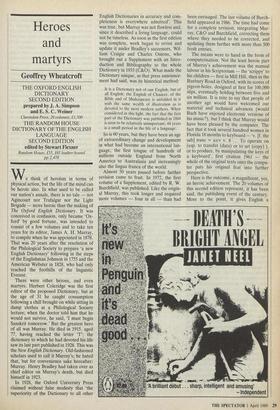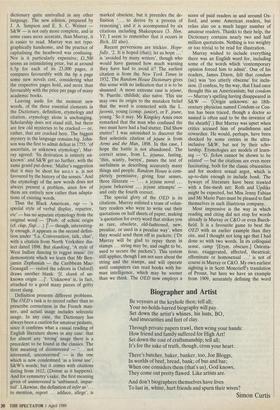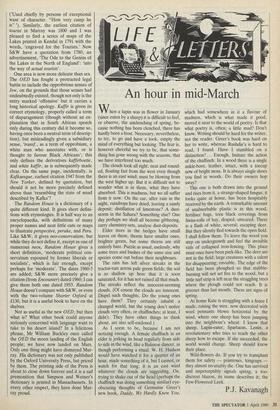Heroes and martyrs
Geoffrey Wheatcroft
THE OXFORD ENGLISH DICTIONARY SECOND EDITION prepared by J. A. Simpson and E. S. C. Weiner
Clarendon Press, 20 volumes, £1,500
THE RANDOM HOUSE DICTIONARY OF THE ENGLISH LANGUAGE SECOND EDITION edited by Stewart Flexner
Random House, £55, £65 leather-bound pp.2,478
We think of heroism in terms of physical action, but the life of the mind can be heroic also. In what used to be called our nation's annals, there is no tale — not Agincourt nor Trafalgar nor the Light Brigade — more heroic than the making of The Oxford English Dictionary. It was conceived in confusion, only became 'Ox- ford' by good fortune, was intended to consist of a few volumes and to take ten years for its editor, James A. H. Murray, to compile when he was appointed in 1878. That was 20 years after the resolution of the Philological Society to prepare 'a new English Dictionary' following in the steps of the Englishman Johnson in 1755 and the American Webster in 1828, who had only reached the foothills of the linguistic Everest.
There were other heroes, and even martyrs. Herbert Coleridge was the first editor of the proposed Dictionary, but at the age of 31 he caught consumption following a chill brought on while sitting in damp clothes at a Philological Society lecture; when the doctor told him that he would not survive, he said, 'I must begin Sanskrit tomorrow.' But the greatest hero of all was Murray. He died in 1915, aged 77, having reached the letter 'T'; the dictionary to which he had devoted his life saw its last part published in 1928. This was the New English Dictionary. Old-fashioned scholars used to call it Murray's; he hated that, but for convenience sake hereafter: Murray. Henry Bradley had taken over as chief editor on Murray's death, but died himself in 1923.
In 1928, the Oxford University Press claimed without false modesty that 'the superiority of the Dictionary to all other English Dictionaries in accuracy and com- pleteness is everywhere admitted'. This was true, but Murray was not flawless and, since it described a living language, could not be timeless. As soon as the first edition was complete, work began to revise and update it under Bradley's successors, Wil- liam Craigie and Charles Onions, who brought out a Supplement with an Intro- duction and Bibliography to the whole Dictionary in 1933 (C&O). What made the Dictionary unique, as that press announce- ment had said, was its historical method:
It is a Dictionary not of our English, but of all English: the English of Chaucer, of the Bible and of Shakespeare is unfolded in it with the same wealth of illustration as is devoted to the most modern authors. When considered in this light, the fact that the first part of the Dictionary was published in 1884 is seen to be relatively unimportant; 44 years is a small period in the life of a language.
So is 60 years, but they have been an age of extraordinary change and development in what had become an international lan- guage, the first tongue of hundreds of millions outside England from North America to Australasia and increasingly also the lingua franca of the world.
Almost 50 years passed before further revision came to fruit. In 1972, the first volume of a Supplement, edited by R. W. Burchfield, was published. Like the origin- al Murray, this took longer and required more volumes — four in all — than had been envisaged. The last volume of Burch- field appeared in 1986. The time had come for a complete revision, integrating Mur- ray, C&O and Burchfield, correcting them where they needed to be corrected, and updating them further with more than 500 fresh entries.
The means were to hand in the form of computerisation. Not the least heroic part of Murray's achievement was the manual labour in his Scriptorium — the `scrippy' to his children — first in Mill Hill, then in the Banbury Road in Oxford, with its scores of pigeon-holes, designed at first for 100,000 slips, eventually holding between five and six million. It is trite to say that people of another age would have welcomed our material and technical advances (would Bach have enjoyed electronic versions of his music?), but I think that Murray would have been pleased by the computer. The fact that it took several hundred women in Florida 18 months to keyboard — 'v. [f. the sub] trans = KEY v. 8 ... To operate on (esp. to transfer (data) or to set (copy) ), or to produce, by manipulating the keys of a keyboard', first citation 1961 — the whole of the original texts onto the compu- ter puts his original feat into further perspective.
Here is the outcome, a magnificent, yes, an heroic achievement. The 20 volumes of this second edition represent, it has been said, the publishing event of the century. More to the point, it gives English a dictionary quite unrivalled in any other language. The new edition, prepared by J. A. Simpson and E. S. C. Weiner — S&W — is not only more complete, and in some cases more accurate, than Murray, it is easier to read. Murray was not typo- graphically handsome, and the practice of capitalising the headword was confusing. Nor is it particularly expensive; £1,500 seems an intimidating price, but at around 6.5p for each of its 23,000 pages, it compares favourably with the 6p a page some new novels cost, considering what the respective pages hold, and more than favourably with the price per page of many academic books.
Leaving aside for the moment new words, of the three essential elements in the Dictionary, definition, etymology and citation, etymology alone is unchanging. Scholarship does not stand still, but there are few old mysteries to be cracked — or, rather, that are cracked here. The biggest mystery in the language remains big. John- son was the first to admit defeat in 1755: 'of uncertain, or unknown etymology'; Mur- ray agreed: 'Its derivation is entirely un- known': and S&W get no further, with the same grand put-down: 'Muller's suggestion that it may be short for BIGLY a. is not favoured by the history of the senses.' And the etymology of the new words does not always present a problem, since few of them are entirely new rather than adapta- tions of existing words.
Thus the Black American, rap — 'a special style of verbal display, repartee, etc' — has no separate etymology from the original word — `[Prob. of echoic origin (cf. clap, flap ...) 1' — though, interesting- ly enough, it appears as the second defini- tion under '5.a. Conversation, talk, chat', with a citation from North Yorkshire dia- lect dated 1898. But skanking, 'A style of West Indian dancing to reggae music' (to demonstrate which we learn that Mr Ben- jamin Zephaniah — the Caribbean Mac- Gonagall — visited the editors in Oxford) draws another blank: If. skank of un- known origin ...I'. 'Unknown' is, in fact, attached to a good many pieces of gritty street slang.
Definition presents different problems. The OED's task is to record rather than to prescribe correctness in the French man- ner, and actual usage includes solecistic usage. In any case, the Dictionary has always been a caution for amateur pedants, since it confirms what a casual reading of English literature shows in any case: that for almost any 'wrong' usage there is a precedent to be found in the classics. The first meaning of disinterested — not interested, unconcerned' — is the one which is now condemned 'as a loose use', S&W's words; but it comes with citations dating from 1612, (Donne as it happens). And for symmetry's sake, the first meaning given of uninterested is 'unbiassed, impar- tial'. Likewise, the definition of infer as' .. . to mention, report ... adduce, allege', is marked obsolete, but it precedes the de- finition to derive by a process of reasoning'; and it is accompanied by six citations including Shakespeare (3. Hen. VI; I seem to remember that it occurs in Rich. III also).
Recent perversions are trickier. Hope- fully, '2. It is hoped (that); let us hope ...' is 'avoided by many writers', though who would have guessed how much warning they have had to avoid it? The earliest citation is from the New York Times in 1932. The Random House Dictionary gives this sense with no indication that it is to be shunned. A more extreme case is jejune, `b. Puerile, childish; also naive. This use may owe its origin to the mistaken belief that the word is connected with the L. juvenis, young (comp. junior), or F. jeune, young.' So it may. Mr Kingsley Amis once remarked that the man who confused the two must have had a bad stutter. Did Shaw stutter? I was astonished to discover the first solecistic citation of jejune is from Arms and the Man, 1898. In this case, I hope the battle is not abandoned. The correct sense, from L. jejunus, fasting, 'thin, scanty, barren', passes the test of usefulness as describing accurately many things and people. Random House is com- pletely permissive, giving four senses, three illiterate — a jejune novel ... jejune behaviour ... jejune attempts' and only the fourth correct.
The special glory of the OED is its citations. Murray enlisted a team of volun- tary readers who were to write out their quotations on half sheets of paper, making 'a quotation for every word that strikes you as rare, obsolete, old-fashioned, new, peculiar, or used in a peculiar way', when they would send them off in packets; (`M- Murray will be glad to repay them in stamps ... string may be, and ought to be, used to secure the packets'). This system still applies, though I am not sure about the string and the stamps, and will operate until computers can read books with hu- man intelligence, which may be sooner than we think. The OED now employs a score of paid readers in and around Ox- ford, and some American readers, but relies also on a much larger number of amateur readers. Thanks to their help, the Dictionary contains nearly two and half million quotations. Nothing is too weighty or too trivial to be read for illustration.
Murray wished to include everything there was an English word for, including some of the words which 'contemporary opinion forced him to admit'. One of his readers, James Dixon, felt that condum (sic) was 'too utterly obscene' for inclu- sion. (I confess, by the way, that I had once thought this an Americanism; but condom — Murray's spelling having disappeared in S&W — `[Origin unknown: no 18th- century physician named Condom or Con- ton has been traced, though a doctor so named is often said to be the inventor of the sheath]'.) But Murray was upset when critics accused him of prudishness and cowardice. He would, perhaps, have been shocked by some entries in the ultra- inclusive S&W, but not by their scho- larship. Etymologies are models of learn- ing — 'G. ficken cannot be shown to be related' — but the citations are even more fascinating, both for the classic obscenities and for modern sexual argot, which is up-to-date enough to include bonk. The byways of literature have been trawled with a fine-mesh net: Roth and Updike might be expected, but Miss Jenny Fabian and Mr Mario Puzo must be pleased to find themselves in such illustrious company.
Most impressive is the way in which reading and citing did not stop for words already in Murray or C&O or even Burch- field. It is a favourite game to beat the OED with an earlier example than they cite, and I thought not long ago that I had done so with two words. In its colloquial sense, camp '[Etym. obscure.] Ostenta- tious, exaggerated, affected, theatrical; effeminate or homosexual ...' is not of course in Murray or C&O. My own earliest sighting is in Scott Moncrieffs translation of Proust, but here we have an example from 1909, accurately defining the word (`Used chiefly by persons of exceptional want of character. "How very camp he is" '). Similarly, the earliest citation of tourist in Murray was 1800 and I was pleased to find a series of maps of the Lakes printed in Kendal in 1791 with the words, 'engraved for the Tourists.' Now S&W have a quotation from 1780, an advertisement, 'The Ode to the Genius of the Lakes in the North of England': 'into the way of actual tourists'.
One area is now more delicate than sex. The OED has fought a protracted legal battle to include the opprobrious senses of Jew, on the grounds that those senses had undoubtedly existed, though not only is the entry marked 'offensive' but it carries a long historical apology. Kaffir is given its correct etymology, properly called a term of disparagement (though without an ex- planation that in South African speech only during this century did it become so, having once been a neutral term of descrip- tion), but misleadingly given a subsidiary sense, `transf., as a term of opprobium, a white man who associates with, or is thought to favour Black Africans'; this only defines the derivatives kaffirboetie, and white kaffir, as is subsequently made clear. On the same page, incidentally, is Kafkaesque, earliest citation 1947 from the New Yorker, defined by quotation, but should it not be more precisely defined above than 'resembling the state of mind described by Kafka'?
The Random House is a dictionary of a quite different kind. It gives short defini- tions with etymologies. It is half way to an encyclopaedia, with definitions of many proper names and neat little cuts or maps to illustrate perspective, peruke, and Peru. Like S&W, it gives neo-conservatism, but while they do not define it, except as one of numerous neos, Random House gives a short definition, 'moderate political con- servatism espoused by former liberals or socialists', which is fair enough, except perhaps for 'moderate'. The dates 1960-5 are added; S&W more precisely give a citation (from Encounter) dated 1960; I can give them both one dated 1953. Random House doesn't compare with S&W, or even with the two-volume Shorter Oxford at £130, but it is a useful book to have on the shelves.
Not as useful as the new OED, but then what is? What other book could anyone seriously concerned with language want to take to his desert island? In a felicitous phrase, Mr William Buckley once called the OED the moon landing of the English people; we have now landed on Mars. Only one thing might have dismayed Mur- ray. His dictionary was not only published by the Oxford University Press, but priced by them. The printing side of the Press is about to close down forever and it is a sad premonition that Simpson and Weiner's dictionary is printed in Massachussets. In every other respect, they have done Mur- ray proud.




















































 Previous page
Previous page